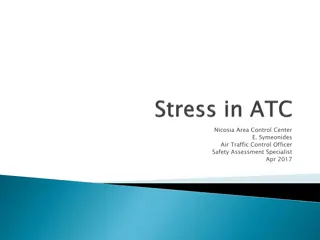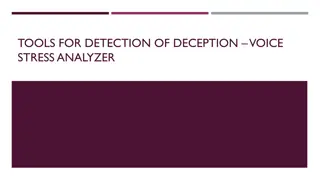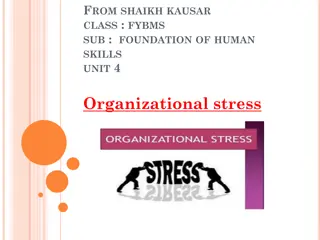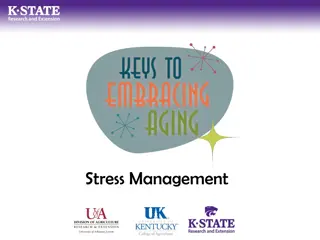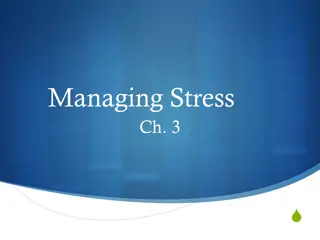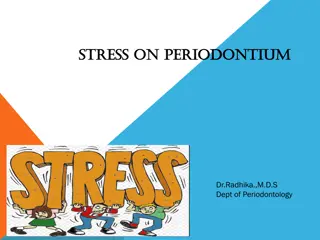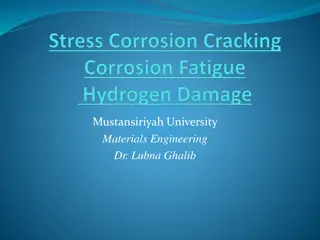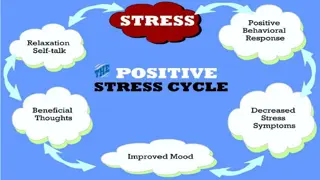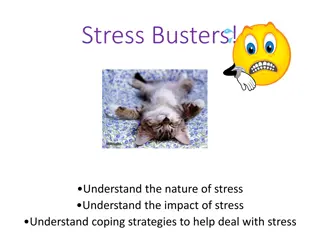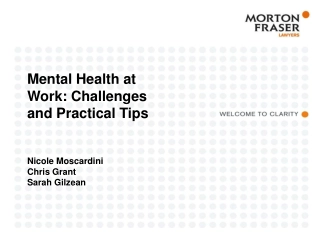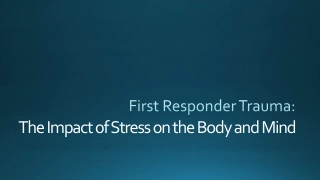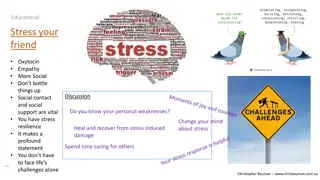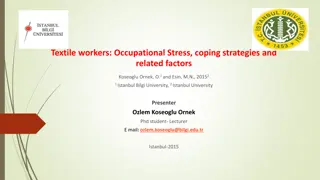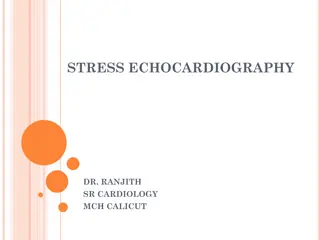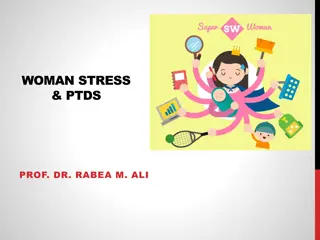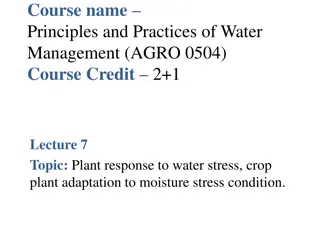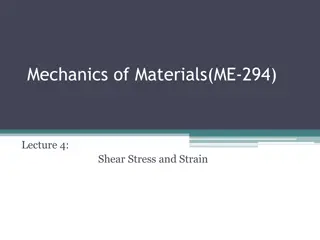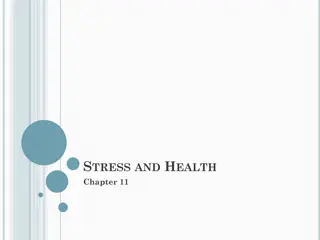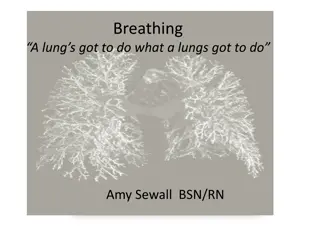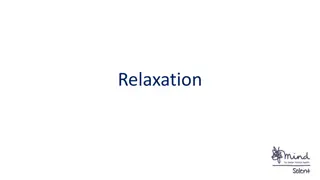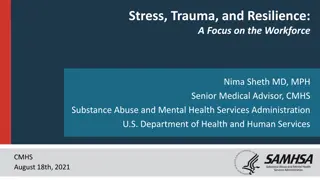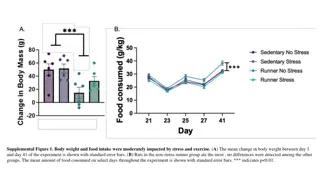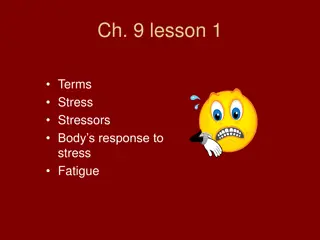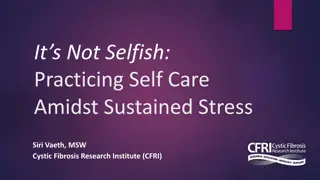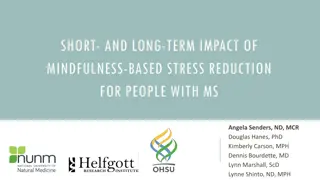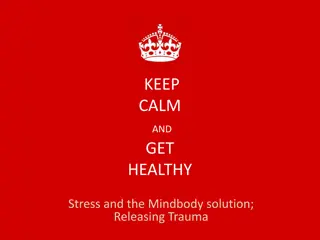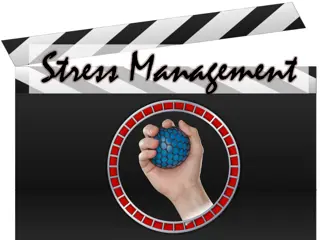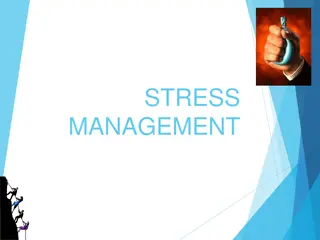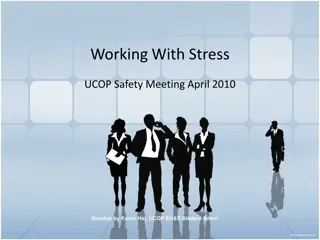Understanding Stress and Its Impact on Health
Stress is a common phenomenon in today's fast-paced world, affecting individuals both mentally and physically. Hans Selye's concept of stress as a nonspecific response to change laid the foundation for understanding its physiology. Recognizing the symptoms of stress, including cognitive and emotional aspects, is crucial in managing its impact on well-being. Stress is a unique disease that manifests differently in individuals, with potential consequences such as alcoholism or depression.
Download Presentation

Please find below an Image/Link to download the presentation.
The content on the website is provided AS IS for your information and personal use only. It may not be sold, licensed, or shared on other websites without obtaining consent from the author. Download presentation by click this link. If you encounter any issues during the download, it is possible that the publisher has removed the file from their server.
E N D
Presentation Transcript
PREPARED BY- DR.ASHUTOSH DWIVEDI ASSISTANT PROFESSOR HARISHCHANDRA P.G. COLLEGE
STRESS AND PHYSIOLOGY OF STRESS AND ROLE OF STRESS ON IMMUNE SYSTEM TOPIC RELATED TO MA 2ND(SEM) PAPER_4(UNIT-4)- PSYCHOBIOLOGY OF MOTIVATION LEARNING AND MEMORY
What is Stress? What is Stress? The modern world, which is said to be a world of achievement, is also a world of stress. Ones finds stress everywhere, whether it be within the family, business organisation. Right from the time of birth till the last breath, an individual faces stressful situations.
The concept of stress was first introduced in life sciences by Hans Selye in 1936,who defined it as the nonspecific response of body to any demand for change.
SYMPTOMS OF STRESS Its very hard to know how easily stress can creep up on you. You don t notice How much it s affecting you. It s very important to be aware of the common signs of stress: Cognitive Symptoms: Inability to concentrate Memory problems Poor judgement Seeing only the negative
Emotional symptoms: Depression or general unhappiness Loneliness and isolation Other mental or emotional problems Physical Symptoms: Eating more or lessSleeping too much or too little Neglecting Responsibility Using alcohol,or drugs to relax Nervous habbits (e.g. Nail biting, pacing)
PHYSIOLOGY OF STRESS Stress is unique in the category of diseases. It has no biological carrier such as a germ or virus. Rather, it is the result of how our mind and body function and interact. It is psychosomatic in the true sense of the word- psyche means mind and soma means body . It is the consequence of how we do not regulate, the mental and physical functioning of our being. It is the disease created by the abuse of our minds and bodies and can lead to totally different symptoms in different people. These may be as contd.........
Innocuous as temper tantrums or as destructive as a heart attack. Stress may express itself through alcoholism or depression. Though it s symptoms are many, it s causes often go unrecognised and untreated. In following lines we see that how our glands help us in stressful situations: Hypothalamus: during time of stress the hypothalamus a collection of nuclei that connects the brain and the endocrine system, signals the pituitary gland to produce a harmone which in turn signals the adrenal glands to increases the production of cortisol. An increase in cortisol can provide the energy required to deal with prolonged or extreme challenge.
Pituitary: This gland known as a master gland. It produces many hormones that travel throughout the body. In production of many hormone one hormone is known as. Adrenocorticotropin (ACTH): ACTH stimulates the cortisol, a stress hormone . It helps maintain blood pressure and blood glucose( sugar) levels, and is produced in large amount when we are in stress. Too much ACTH will result in too much cortisol production; called Cushing s disease. Low ACTH will result as: Adrenal Insufficiency. Adrenal Axis: Also known as suprarenal glands. Adrenal gland produce hormone that help regulate your metabolism immune blood pressure response to stress and other essential functions.
ROLE OF STRESS ON IMMUNE SYSTEM We know that the nervous system has considerable control over the immune system. Unfortunately, the term stress applies to a wide variety of events and different kinds of stress stress produce different effects on the body. Some studies show how stress play a key role in disregulation of immune system. Kiecolt Glaser and Glaser confirmed this by comparing the immune function of exam- stressed medical students givan hypnosis and relaxation training with that of students without training. The outcomes of this study was: those who practices conscientiously did actually have significantly contd.....
better immune function during exams than students who practiced erratically or not at all. Sarrah Pressman,Sheldon Cohen study for the stress immunity and disease, found that socila isolation and feelings of loneliness each independently weakened first year students immunity. When we overview all the segments we have to tell taht there are negative correlation in stress and immune system.



